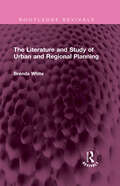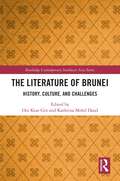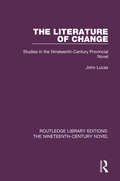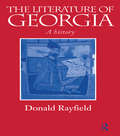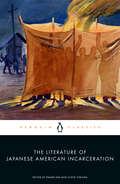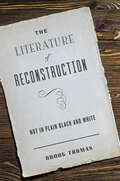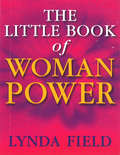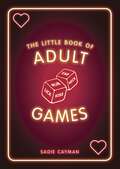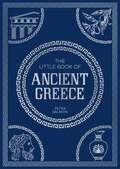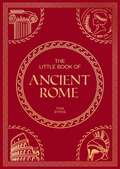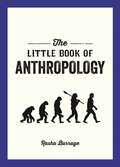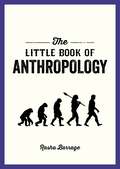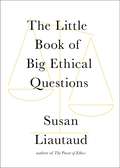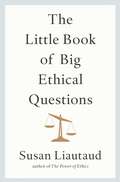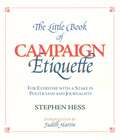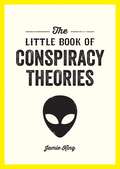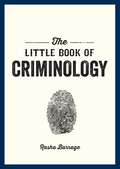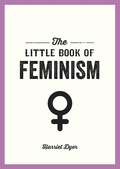- Table View
- List View
The Literature and Study of Urban and Regional Planning (Routledge Revivals)
by Brenda WhiteFirst published in 1974, The Literature and Study of Urban and Regional Planning discusses the processes of spatial planning and the range of subject knowledge which is required to contribute to it. It describes the physical forms in which the literature relating to spatial planning is usually presented and the ways in which this literature is made available in different types of organization. The author gives details of the most useful libraries whose facilities are available to students, and of the research which is being undertaken into the principal problems of planning information. The second part of the book consists of a subject bibliography, divided for ease of reference into twenty-six sections each concerned with a component part of spatial planning and containing annotated references to books, official publications, developmental plans, legislation, and other material. This book will be of interest to students of sociology and urban studies.
The Literature of Brunei: History, Culture, and Challenges (Routledge Contemporary Southeast Asia Series)
by Kathrina Mohd Daud Ooi Keat GinThis book presents an overview of the literature of Brunei, surveying literary traditions, innovations, and new approaches as well as historical and contemporary issues and challenges.This book highlights the unique characteristics of Bruneian literature, including its approach to bilingualism - Brunei Malay and English - its historical intertwining with monarchs and myths, and how its emerging developments can be charted in the twenty-first century.Gathering together the work of both established and emerging scholars of Bruneian literature and history, this book brings detailed scholarship to an English-speaking audience, some of which was originally written in the Malay language, and highlights a Bruneian perspective. In drawing out the peculiar traditions, innovations, and challenges of Bruneian literature, this collection of essays is not only original in concept but also a pioneering endeavour.The Literature of Brunei will be of interest to researchers in World and Asian Literature, in particular Southeast Asian literature.
The Literature of Change: Studies in the Nineteenth Century Provincial Novel (Routledge Library Editions: The Nineteenth-Century Novel #24)
by John LucasFirst published in 1977, this book studies three important nineteenth-century novelists: Mrs Gaskell, William Hale White and Thomas Hardy. They are all provincial novelists who wrote about social change and the attendant problems and pressures this brought with it. Unlike previous critics, who have tended to concentrate on her ‘social-problem’ novels, here the author treats Gaskell’s Sylvia’s Lovers and Cousin Phillis as central texts. However a chapter also examines Gaskell and Engels perception of social change in Manchester. This book also seeks to correct Hale White’s neglect, anointing Revolution in Tanner’s Lane and Clara Hopgood major works. The survey of women in Hardy’s novels represents an illuminating new angle and leads on to a discussion of love and marriage in later Victorian fiction.
The Literature of Georgia: A History (Caucasus World)
by Donald RayfieldThe first comprehensive and objective history of the literature of Georgia, revealed to be unique among those of the former Byzantine and Russian empires, both in its quality and its 1500 years' history. It is examined in the context of the extraordinarily diverse influences which affected it - from Greek and Persian to Russian and modern European literature, and the folklore of the Caucasus.
The Literature of Japanese American Incarceration
by Frank Abe Floyd Cheung&“An essential volume&” —Hua Hsu, The New YorkerThe collective voice of Japanese Americans defined by a specific moment in time: the four years of World War II during which the US government expelled resident aliens and its own citizens from their homes and imprisoned 125,000 of them in American concentration camps, based solely upon the race they shared with a wartime enemy.A Penguin ClassicThis anthology presents a new vision that recovers and reframes the literature produced by the people targeted by the actions of President Franklin D. Roosevelt and Congress to deny Americans of Japanese ancestry any individual hearings or other due process after the Japanese attack at Pearl Harbor. From nearly seventy selections of fiction, poetry, essays, memoirs, and letters emerges a shared story of the struggle to retain personal integrity in the face of increasing dehumanization – all anchored by the key government documents that incite the action.The selections favor the pointed over the poignant, and the unknown over the familiar, with several new translations among previously unseen works that have been long overlooked on the shelf, buried in the archives, or languished unread in the Japanese language. The writings are presented chronologically so that readers can trace the continuum of events as the incarcerees experienced it.The contributors span incarcerees, their children born in or soon after the camps, and their descendants who reflect on the long-term consequences of mass incarceration for themselves and the nation. Many of the voices are those of protest. Some are those of accommodation. All are authentic. Together they form an epic narrative with a singular vision of America&’s past, one with disturbing resonances with the American present.
The Literature of Reconstruction: Not in Plain Black and White
by Brook ThomasReconstruction-era literature helped shape an ongoing national debate about proper remedies to racial wrongs.In this powerful book, Brook Thomas revisits the contested era of Reconstruction. He evokes literature’s immediacy to recreate arguments still unresolved today about state versus federal authority, the government’s role in education, the growing power of banks and corporations, the paternalism of social welfare, efforts to combat domestic terrorism, and the difficult question of who should rightly inherit the nation’s past. Literature, Thomas argues, enables us to re-experience how Reconstruction was—and remains—a moral, economic, and political debate about which world should have emerged after the Civil War to mark the birth of a new nation.Drawing on neglected nineteenth-century historiographies and recent scholarship that extends the dates of Reconstruction in time while stretching its geographic reach beyond the South, The Literature of Reconstruction uses literary works to trace the complicated interrelations among the era’s forces. Thomas also explores how these works bring into dialogue competing visions of possible worlds through chapters on reconciliation, federalism, the Ku Klux Klan, railroads, and inheritance. He contrasts well-known writers, including W. E. B. Du Bois, Thomas Dixon, and Charles W. Chesnutt, with relatively neglected ones, including Albion W. Tourgée, María Amparo Ruiz de Burton, and Constance Fenimore Woolson. Some authors opposed Reconstruction; others supported it; and still others struggled with mixed feelings. The world Thomas conjures up in this groundbreaking new study is one in which successful remedies to racial wrongs remain to be imagined.
The Little Book Of Woman Power
by Lynda FieldWoman Power is about taking a little time to focus on you; it is about feeling sexy and clever, sensitive and strong.Whether you are a busy mother, a career woman, or both, Woman Power will help you succeed in and enjoy every aspect of your life.
The Little Book of Adult Games: Naughty Games for Grown-Ups
by Sadie CaymanNo matter how much of a sexpert you may be, things in the bedroom can always benefit from a little extra spice. This collection of titillating treats, from frisky foreplay teasers to downright dirty duvet dalliances, has something for every sexual occasion, and should get you hot under the collar and ready for some stripped-down bedroom action. So get your sexiest underwear on and prepare to take it off not long after, ’cause it’s time to play!
The Little Book of Adult Games: Naughty Games for Grown-Ups
by Sadie CaymanNo matter how much of a sexpert you may be, things in the bedroom can always benefit from a little extra spice. This collection of titillating treats, from frisky foreplay teasers to downright dirty duvet dalliances, has something for every sexual occasion, and should get you hot under the collar and ready for some stripped-down bedroom action. So get your sexiest underwear on and prepare to take it off not long after, ’cause it’s time to play!
The Little Book of Ancient Greece: A Pocket Guide to an Epic Civilization, Including Key Events, People, Trivia and More
by Summersdale PublishersIf you've ever been curious about the rich culture and vibrant history of Ancient Greece, dive into this whirlwind tour of the highlights of this epic civilization. From warfare and politics, to art, culture and everyday life, uncover the key events, people and trivia you need to know to understand this remarkable period of history.
The Little Book of Ancient Rome: A Pocket Guide to an Epic Civilization, Including Key Events, People, Trivia and More
by Summersdale PublishersGrowing from humble origins into a world-spanning empire, the Ancient Roman civilization has captured human imagination for generations. Uncover its history, from the legendary Roman army and its conquests to the art, culture and everyday life of its citizens, in this fascinating little book, which will be your pocket-sized window into the past.
The Little Book of Anthropology
by Rasha BarrageIf you&’re intrigued by the question &“What makes us human?&”, strap in for this whirlwind tour of the highlights of anthropology.From the first steps of our prehistoric ancestors, to the development of complex languages, to the intricacies of religions and cultures across the world, diverse factors have shaped the human species as we know it. Anthropology strives to untangle this fascinating web of history to work out who we were in the past, what that means for human beings today and who we might be tomorrow.
The Little Book of Anthropology: A Pocket Guide to the Study of What Makes Us Human
by Rasha BarrageIf you’re intrigued by the question “What makes us human?”, strap in for this whirlwind tour of the highlights of anthropologyFrom the first steps of our prehistoric ancestors, to the development of complex languages, to the intricacies of religions and cultures across the world, diverse factors have shaped the human species as we know it. Anthropology strives to untangle this fascinating web of history to work out who we were in the past, what that means for human beings today and who we might be tomorrow.This pocket-sized introduction includes accessible primers on:Influential anthropologists such as Franz Boas, Margaret Mead and Ruth BenedictThe key branches of anthropology, from physical and linguistic anthropology to archaeologyHow anthropologists study topics such as communication, identity, sex and gender, religion and cultureHow we can approach one of life’s most enduring questions: what is it that truly makes us human?This illuminating little book will introduce you to the key thinkers, themes and theories you need to know to understand the development of human beings, and how our history has informed the way we live today. A perfect gift for anyone taking their first steps into the world of anthropology, as well as for those who want to brush up their knowledge.
The Little Book of Big Ethical Questions
by Susan LiautaudPerfect for your next dinner party discussion, The Little Book of Big Ethical Questions presents some of today&’s most thought-provoking ethical questions in a welcoming, easy-to-discuss Q&A format, with guidance from a renowned ethicist.Often a single question can spark a meaningful exchange—like &“Would you apply for a job you know your friend is applying for?&” Or &“Should voting be mandatory?&” Or what about police using facial recognition technology? Questions like these spur us to consider: What would I have done? Is there one correct answer? And ultimately: How can ethics help us navigate these situations to find the best outcome for ourselves and others? An ethicist who advises leaders and organizations worldwide, Susan Liautaud asks intriguing questions that encourage lively discussion across a range of subjects, from family and friends to health and technology to politics, work, and consumer choices. She then walks through the ways you might approach each situation to find the best answer for you. Grab the book, gather a few friends, and dive in!
The Little Book of Big Ethical Questions
by Susan LiautaudDoes a parent have the right to monitor their child&’s social media? Should the COVID-19 vaccine be mandatory? Can we still appreciate art if the artist has done terrible things? Is it OK for the police to use facial recognition technology? The best conversations between friends, family and acquaintances are the ones that touch on real issues. Whether these conversations occur in the lecture theatre, meetings, or around the dinner table, ethical quandaries make for a great topic of conversation – and usually a heated debate! From the infamous Ethical questions are always intriguing and ask us to pause and consider: What would you have done? What&’s the context? Is there one right answer? And ultimately - can ethics guide us to better answers to all these questions? In The Little Book of Big Ethical Questions, ethical questions are presented in a clear, easy-to-read way that&’s designed for a question to be asked aloud and discussed with others. Each spread has a question on the left-hand side with context, ethical considerations, history and the personal approach of the author, a renowned ethicist who consults clients worldwide from global corporations to NGOs, on the right.
The Little Book of Campaign Etiquette: For Everyone with a Stake in Politicians and Journalists
by Judith Martin Stephen HessRevised and updated just in time for the 2000 campaign, this shrewd and amusing series of observations provides a political etiquette for campaign behavior on the part of both politicians and journalists. Features illustrations by America's foremost political cartoonists, including Herblock, Paul Conrad, Jeff McNally, Don Wright, Garry Trudeau, Jim Borgman, Mike Peters, Tom Toles, Mike Luckovich, Steve Benson, and Walt Handelsman. "Stephen Hess has stepped into the breach with answers to questions that ought to be more frequently asked...This breezy book is likely to be of interest to anyone who follows - or worries about - the state of the nation's political discourse." - USA Today
The Little Book of Christmas
by Chronicle BooksThis festive follow-up to The Little Book of Saints and The Little Book of Angels explores the wonderful rituals and rich history surrounding Christmas. From the story of the nativity to the legends that have inspired beloved holiday traditions (like why Father Christmas arrives through the chimney), this collection includes Christmas customs from around the world. Beautifully illustrated with color lithographs taken from missals and prayer books, this joyful little book is a Christmas treasure for the whole family to gather around year after year.
The Little Book of Conspiracy Theories: A Pocket Guide to the World’s Greatest Mysteries
by Jamie KingThe curious world of conspiracy theories is unbelievable and scarily believable in equal measure. The Little Book of Conspiracy Theories is an insight into this shocking and mysterious world. Discover how popular theories originated and took root, what they claim, and how "the truth" has been covered up with this introductory guide.
The Little Book of Conspiracy Theories: A Pocket Guide to the World’s Greatest Mysteries
by Jamie KingThe curious world of conspiracy theories is unbelievable and scarily believable in equal measure. The Little Book of Conspiracy Theories is an insight into this shocking and mysterious world. Discover how popular theories originated and took root, what they claim, and how "the truth" has been covered up with this introductory guide.
The Little Book of Criminology: A Pocket Guide to the Study of Crime and Criminal Minds
by Rasha BarrageHave you always wanted to know what makes an ordinary person commit a crime? Explore the dark side of human nature with this beginner's guide to criminology. From understanding criminal motivation to how crime is policed and prevented, there has never been a more important moment to grasp how crime affects our lives today and how it might tomorrow.
The Little Book of Criminology: A Pocket Guide to the Study of Crime and Criminal Minds
by Rasha BarrageHave you always wanted to know what makes an ordinary person commit a crime? Explore the dark side of human nature with this beginner's guide to criminology. From understanding criminal motivation to how crime is policed and prevented, there has never been a more important moment to grasp how crime affects our lives today and how it might tomorrow.
The Little Book of Faeries: An Enchanting Introduction to the World of Fae Folk
by Mel BarrenPeople have long been mesmerized by the magic and mystery of Fae folk. Step into this enchanting world of faeries, pixies, sprites and more with this beginner's guide to the essential history and mythology. Just like the creatures themselves, this book is pocket-sized and full of magic, mirth and mischief.
The Little Book of Faeries: An Enchanting Introduction to the World of Fae Folk
by Mel BarrenPeople have long been mesmerized by the magic and mystery of Fae folk. Step into this enchanting world of faeries, pixies, sprites and more with this beginner's guide to the essential history and mythology. Just like the creatures themselves, this book is pocket-sized and full of magic, mirth and mischief.
The Little Book of Feminism (The\little Book Of Ser.)
by Harriet DyerDo you want to know more about the fight for women’s rights? From the rabble-rousers of the suffragist movement to the bloggers of today, this comprehensive little guide will teach you the history, theory and big issues and everything you need to know to become a CARD-CARRYING FEMINIST.
The Little Book of Feminism (The\little Book Of Ser.)
by Harriet DyerDo you want to know more about the fight for women’s rights? From the rabble-rousers of the suffragist movement to the bloggers of today, this comprehensive little guide will teach you the history, theory and big issues and everything you need to know to become a CARD-CARRYING FEMINIST.
